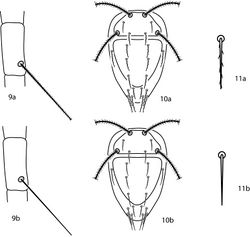Maintenance
All wikis at Biowikifarm are in read-only mode due to the restoration after a severe cyberattack in October 2023.
After 1 year being shut down the Biowikifarm is online again.
You see the latest restored version from 18th October 2023.
Bonzia
| Notice: | This page is derived from the original publication listed below, whose author(s) should always be credited. Further contributors may edit and improve the content of this page and, consequently, need to be credited as well (see page history). Any assessment of factual correctness requires a careful review of the original article as well as of subsequent contributions.
If you are uncertain whether your planned contribution is correct or not, we suggest that you use the associated discussion page instead of editing the page directly. This page should be cited as follows (rationale):
Citation formats to copy and paste
[Expand] |
Ordo: Trombidiformes
Familia: Cunaxidae
Name
Bonzia Oudemans, 1927 – Wikispecies link – Pensoft Profile
Historical review
Oudemans (1927)[1] erected Bonzia for Bonzia halacaroides. Willmann (1939)[2] described Bonzia sphagnicola from Germany. Willmann (1950)[3] described Bonzia rufofusca. Bonzia brownei was described by Turk (1972)[4]. Den Heyer (1977) provided a detailed redescription of type material of this genus. Kuznetzov and Livshitz (1979)[5] reported Bonzia from Russia. Michocka (1987)[6] reported Bonzia halacaroides from Poland. Smiley (1992)[7] described Bonzia woodi and Bonzia yunkeri and synonymized Bonzia rufofusca and Bonzia brownei with Bonzia halacaroides. Skvarla et al. reported Bonzia yunkeri from the Ozark Mountains in Arkansas.
Diagnosis
Gnathosoma. Pedipalps 5-segmented and reach beyond the subcapitulum by at most the distal half of the tibiae. Apophyses absent. A dorsal multi-branched seta present on the telofemora. The tibiotarsi terminate in a stout claw. 2 pairs of adoral setae present or absent. Subcapitulum with 4 pairs of setae (hg1–4) present. Setae hg1 are geniculate.
Idiosoma, dorsal. proterosoma bears a shield complemented with 2 pairs of setae (at and pt) and 2 pairs of setose sensillae (lps and mps). The dorsal hysterosoma bears a shield that may be complemented with a variable number of setae depending on the extent of the shield. Setae c1–h1, c2, f2 and h2 present, and are smooth or spiculate. Cupule im present laterad and caudally of e1. Integument that does not bear shields or plates is striated.
Coxae I–II fused and coxae III–IV fused. Genital plates bear 4 setae; 2 pairs of genital papillae visible underneath the plates. 4 pairs of setae present on the anal plates. Trichobothrium on leg tibia IV present. Ambulacral claws occur on either side of a 4-rayed empodium.
Key to adult female Bonzia
(modified from Smiley 1992[7])
Taxon Treatment
- Skvarla, M; Fisher, J; Dowling, A; 2014: A review of Cunaxidae (Acariformes, Trombidiformes): Histories and diagnoses of subfamilies and genera, keys to world species, and some new locality records ZooKeys, 418: 1-103. doi
Images
|
Other References
- Jump up ↑ Oudemans A (1927) Acari van het Eiland Heridia. Acarologische Aantekeningen LXXXVIII. Entomologische Berichten (Amsterdam) 7(157): 257–268.
- Jump up ↑ Willmann C (1939) Die Moorfauna des Glatzer Schneeberges. 3. Die milben des Schneeberg-moore. Beitrage zur Biologie des Glatzer. Schneeberges, Breslau, 5: 427–458.
- Jump up ↑ Willmann C (1950) Milben aus Mineral quellen. Zoologischer Anzeiger 145(7–8): 188–190.
- Jump up ↑ Turk F (1972) Biological notes on Acari recently recorded from British caves and mites with descriptions of three new species. Transactions of the Cave Research Group of Great Britain 14(4): 187–194.
- Jump up ↑ Kuznetzov N, Livshitz I (1979) Predatory mites of the Nikita Botanical Gardens (Acariformes: Bdellidae, Cunaxidae Camarobiidae). Trudy Gosudarstvennogo Nikitskogo Botanicheskogo Sada 79: 51–105.
- Jump up ↑ Michocka S (1987) Mites (Acari) of the Bdellidae and Cunaxidae families in Poland. Monografie Fauny Polski 14: 1–127.
- ↑ Jump up to: 7.0 7.1 Smiley R (1992) The predatory mite family Cunaxidae (Acari) of the world with a new classification. Indira Publishing House, West Bloomington, Michigan, 356 pp.



